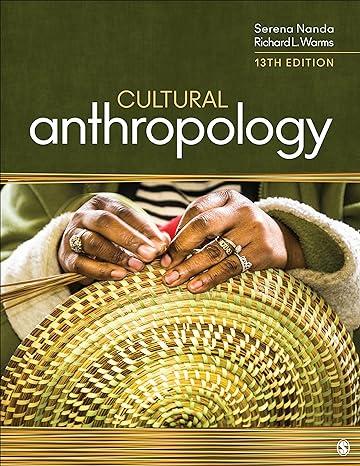If you could change a single thing in your community, what would it be? How do you
Question:
If you could change a single thing in your community, what would it be? How do you think the change would affect other aspects of your community?
As this chapter has shown, cultures and societies around the world are faced with grave concerns. Keeping abreast of current events is often a depressing task. However, our study of anthropology gives us reasons for hope. Although the world is grappling with serious problems, we have more means at our disposal to solve these problems and improve people's lives than ever before. Anthropology can play a critical role in this process. The anthropological methodology and perspective emphasize understanding the meaning and experiences of cultural differences. Anthropologists certainly don't approve of all cultural practices. However, participant observation encourages us to experience the radical empathy that can defeat the division of the world into "us" and "them."
Anthropology teaches us about the dynamic elements of social organization. In this book, we have seen how anthropologists study economics, systems of production, political organization, stratification, beliefs and meaning, art, and history to develop analyses of culture. Anthropologists create models of cultures that explain the interrelationships between cultural elements and allow us to think productively about change, power, inequality, and meaning.
Anthropology cannot solve all of the world's problems, but it does have important contributions to make. With its holistic approach and emphasis on the importance of cultural differences, anthropology can develop frameworks to analyze and understand events and processes. We can help governments, organizations, and other groups find solutions that are sensitive to local cultural traditions and that respond to people's needs and aspirations. Anthropology can help with problems as diverse as how to provide the best medical care for a society or how to create the best customer service experiences.
Anthropology also has a significant role to play in documentation. Anthropologists have been doing high-quality fieldwork around the world for almost 150 years, ensuring that people's stories are not forgotten. Some of the cultures that anthropologists studied in the early \(20^{\text {th }}\) century have practically disappeared, and almost everyone in the world today lives very differently than they did in the late \(19^{\text {th }}\) century. Anthropology provides an important record of the human experience that might otherwise be lost or forgotten.
Anthropology offers hope to humanity because it shows us that biology is not destiny. Human culture rests on biological foundations. We have culture because our brains and bodies have evolved to create it, learn it, and to be dependent on it. Biology may predispose us to behave in certain ways, but no aspect of human culture can be firmly tied to a gene, and while predispositions may encourage people to behave in certain ways, they do not require it. Social rules may easily go against predispositions.
Anthropologists have shown over and over that culture is enormously flexible, fantastically changeable, and almost incredibly varied. The problems we face are not the result of a fixed and unchanging human nature. Violence, poverty, racism, and hatred of all kinds are caused by and shaped by culture. They do not exist because humans are invariably given to warfare and hatred or because human nature somehow demands extreme wealth and desperate poverty. These are social facts-aspects of human culture and human society. Because they are cultural, they can be changed. We can continue to invent new cultural forms-new designs for living.
Step by Step Answer:






